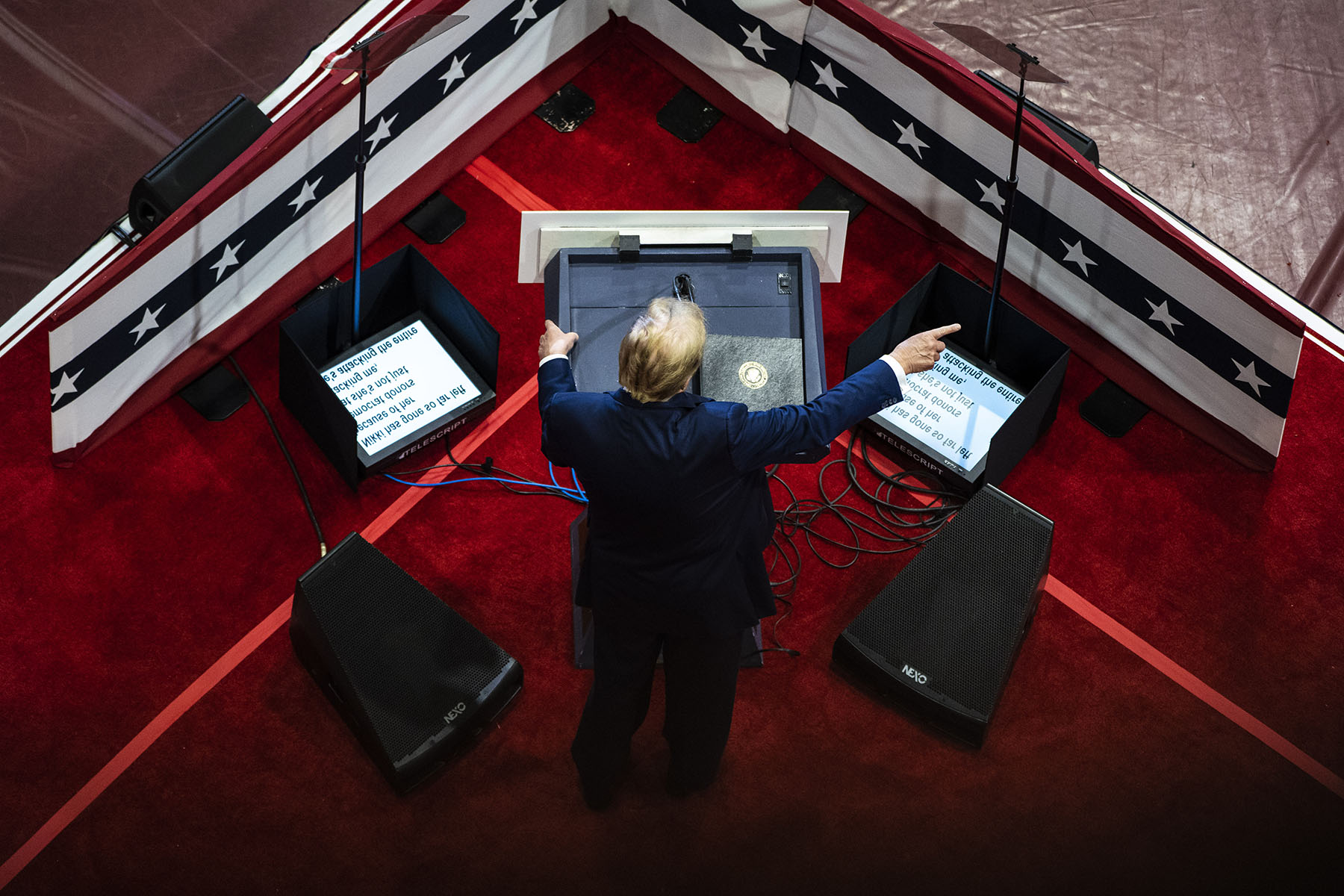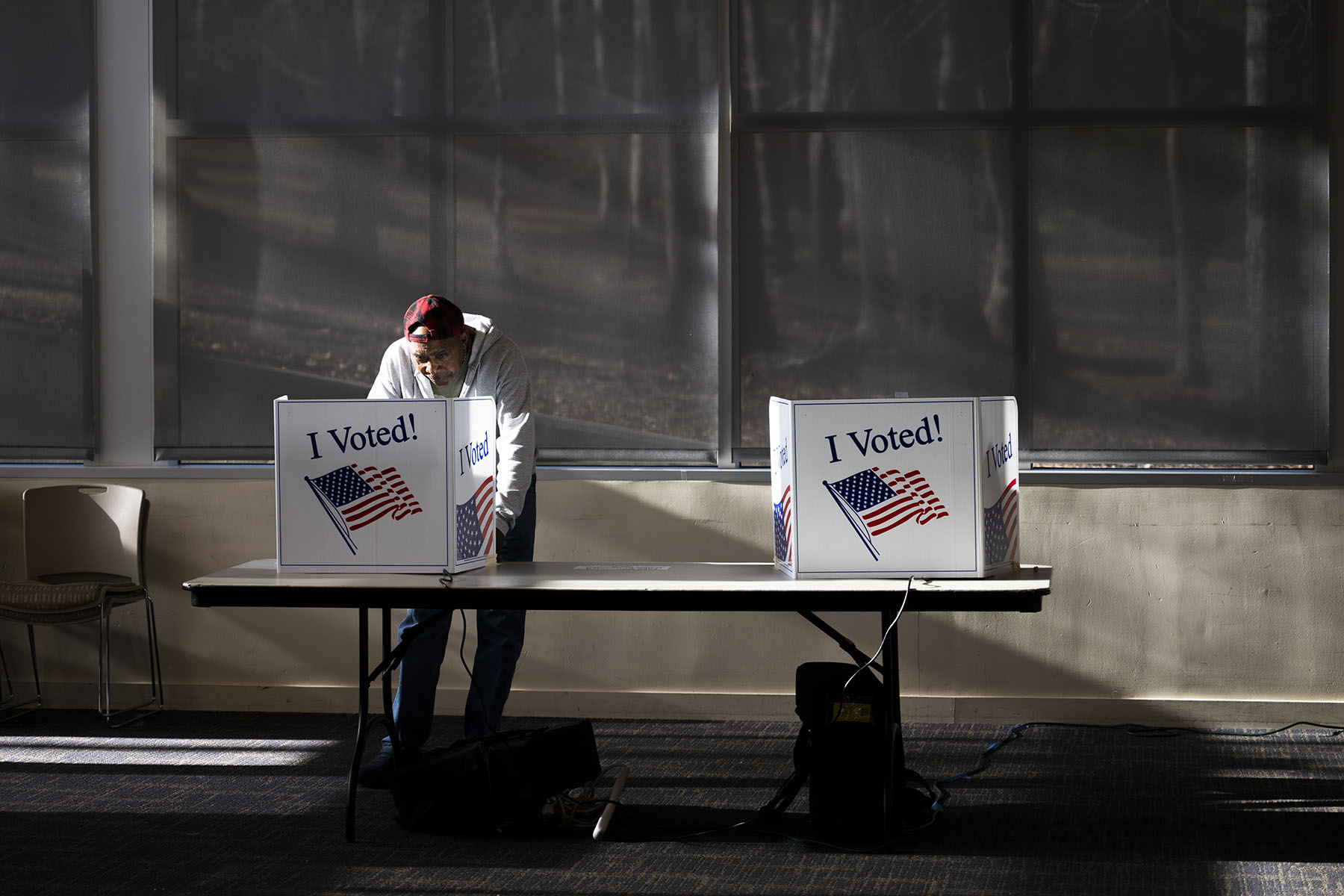This column first appeared in The Amendment, a biweekly newsletter by Errin Haines, The 19th’s editor-at-large. Subscribe today to get early access to future analysis.
Identity politics are a reality of elections. So why aren’t the presidential candidates in either party better at talking about race — particularly to the Black voters who are already such a focus of the 2024 campaign?
On the Republican side, former President Donald Trump is again returning to a racial playbook that exploits and weaponizes stereotypes. His lone rival, Nikki Haley, largely avoids discussing identity — despite being the only woman and person of color still standing in the contest.
President Joe Biden and Vice President Kamala Harris are working to shore up Black support headed into November. But while they are effective at responding to racist rhetoric, their message to Black voters — a key constituency in their reelection victory strategy — isn’t yet resonating.
“Whenever there’s an election, there’s this drumbeat of attention on Black voters and the sort of expectation that Black voters will save democracy,” said Brown University political scientist Juliet Hooker. “That doesn’t necessarily translate into attention to the things Black voters care about, so there’s a kind of disconnect there.”
If Americans are truly in a battle for the country’s soul, we’re losing — because we still haven’t figured out how to talk about race. It’s not just about 2024; it is the unfinished business of our democracy.
During Black History Month, the Republican pitch to Black voters landed as more racist than appealing. After Trump unveiled his “Never Surrender” gold high-top sneakers at SneakerCon in Philadelphia, a conservative pundit suggested that the shoes would help him appeal to Black voters, saying, “This is connecting with Black America, because they love sneakers!” And at a gathering of Black conservatives ahead of last week’s South Carolina GOP primary, Trump implied in a speech that Black voters could support him because of their shared challenges with the criminal justice system.
“I got indicted for nothing, for something that is nothing,” Trump told the crowd. “A lot of people said that’s why the Black people like me, because they have been hurt so badly and discriminated against, and they actually viewed me as I’m being discriminated against. It’s been pretty amazing but possibly, maybe, there’s something there.”
-
Listen To The Amendment Podcast:
-
Listen To The Amendment Podcast: The Amendment: Investigating Child Care with Chabeli Carrazana
But Trump’s legal issues are not tied to the decades of systemic inequality Black Americans have faced on issues from education to housing — including from the ex-president whose reputation as an exploitative landlord in New York is well-documented. His stance today is also a far cry from the full-page ad he took out in several of the city’s newspapers in 1989, prematurely convicting in the court of public opinion a group of Black teenagers wrongly accused in the the Central Park Five rape case.
Black voters have also historically overwhelmingly voted for Democrats — including rejecting Trump in 2016 and 2020.
“Him saying these atrocious things, sadly it’s not surprising,” said Republican strategist Susan Del Percio. “It’s insulting and I think he wrongly thinks this kind of talk appeals to Black males. They’re not going to him in droves, not enough to win an election.”
Instead, Del Percio said, Trump’s offensive remarks could have the opposite intended effect and galvanize Black voters to cast a ballot against him, particularly the Black women who are the Democrats’ most loyal and consistent voting group, the turnout engine of the party and who cast ballots not just on behalf of their community and to mitigate racial harm.

Trump also weaponized race against Haley on the campaign trail, raising questions about her birthplace and misspelling her birth name. Haley brushed off the comments and rarely makes mention of her race or gender. It’s an attempt to appeal to Republican voters who tend to be less interested in identity.
“They don’t mind being aware of it, but I don’t think they like being reminded of it,” Del Percio said. “To them, that’s a little too politically correct.”
Biden ran his campaign as “a battle for the soul of America,” seeking to repair racial divisions. He came into office prioritizing racial equity as a pillar of his administration.
On the campaign trail, he and Harris tout their record of accomplishment for Black Americans — including support for HBCUs, record low Black unemployment, student loan debt relief and the nomination of the first Black woman Supreme Court justice.
“Biden has a really strong talking point that he is talking about and focusing on issues that impact Black families,” said Democratic strategist Maya Rupert. “They need to be talking about it and talking about it louder.”
But the policy victories can get lost in the GOP culture war, putting Democrats on defense as they attempt to thread the needle between courting Black voters and trying to win back the working-class White voters who have long broken for Republicans. For some Black voters, Biden’s rhetoric on race has been less clear than his governing — especially on the legislative disappointments on issues like police reform and voting rights.
Amid renewed voter suppression efforts in an absence of federal voting protections, the Biden-Harris campaign has also emphasized voter turnout, pointing to the threat of another Trump presidency as harmful to Black Americans. But it’s a strategy focused on what Black voters can do for them and for democracy, not what they plan to do for Black voters, said Hooker.
“There isn’t really a pitch of, ‘This is our vision for how this can be a better country,’” Hooker said. “It’s more, ‘You need to vote for us, because we’re the only thing standing between you and that.’ Why is it always Black voters who have to make these sacrifices for democracy?”
Race also matters on the campaign trail in terms of representation. The two women of color who are shaping the 2024 contest are navigating how their identities could factor into voters’ choices and implications for our political leadership and imagination.
Three years into her historic term, Harris continues to face racist and gendered attacks. Scrutiny of her performance is legitimate, given Biden’s status as the oldest president ever. But voter concerns about his age aside, coverage of her tenure has focused less on her actually doing the job and more on questions of her competency and likeability — the latter being much less of a focus for men in politics.
While Haley is often unwilling to dive deep into questions of identity, she has made history, getting more delegates than any Republican woman before her. And she has pointed out that a woman is the last one standing against Trump after all the “fellas” dropped out.
Both Harris and Haley are undeniably being held to a different standard in 2024, Rupert said.
“Every woman would benefit from calling that out more explicitly and being very vigilant about not letting those kinds of thinly veiled things pass,” Rupert said. “We have to let go of this idea that because racism and sexism exist, it’s OK to perpetuate them. That kind of vitriol and the more subtle, veiled attacks, impact more than the people they’re being directed at. They impact people who see this and say, ‘There isn’t space for me in our politics, because this is how women of color get treated.’”
In a year in which voter enthusiasm is lagging, the message matters — and race will continue to shape the election. The message Black voters get could determine how they turn out, or if they’re turned off and decide to stay home.








